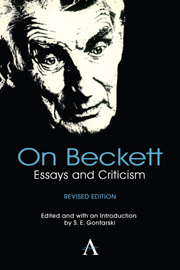Book contents
- Frontmatter
- Contents
- The Essential Beckett: A Preface to the Second Edition
- A Beckett Chronology
- Acknowledgments
- Crritics and Crriticism: “Getting Known”
- Preliminaries
- The Page
- The Stage
- MacGowran on Beckett
- Blin on Beckett
- Working with Beckett
- Notes from the Underground: Waiting for Godot and Endgame
- Beckett Directs Godot
- Beckett Directs: Endgame and Krapp's Last Tape
- Literary Allusions in Happy Days
- Counterpoint, Absence, and the Medium in Beckett's Not I
- Rehearsal Notes for the German Premiere of Beckett's That Time and Footfalls
- Footfalls
- Samuel Beckett and the Art of Radio
- Light, Sound, Movement, and Action in Beckett's Rockaby
- Beckett's Ohio Impromptu: A View from the Isle of Swans
- Quad and Catastrophe
- Coda
- Notes on Contributors
Counterpoint, Absence, and the Medium in Beckett's Not I
from The Stage
Published online by Cambridge University Press: 05 May 2013
- Frontmatter
- Contents
- The Essential Beckett: A Preface to the Second Edition
- A Beckett Chronology
- Acknowledgments
- Crritics and Crriticism: “Getting Known”
- Preliminaries
- The Page
- The Stage
- MacGowran on Beckett
- Blin on Beckett
- Working with Beckett
- Notes from the Underground: Waiting for Godot and Endgame
- Beckett Directs Godot
- Beckett Directs: Endgame and Krapp's Last Tape
- Literary Allusions in Happy Days
- Counterpoint, Absence, and the Medium in Beckett's Not I
- Rehearsal Notes for the German Premiere of Beckett's That Time and Footfalls
- Footfalls
- Samuel Beckett and the Art of Radio
- Light, Sound, Movement, and Action in Beckett's Rockaby
- Beckett's Ohio Impromptu: A View from the Isle of Swans
- Quad and Catastrophe
- Coda
- Notes on Contributors
Summary
“The medium of drama,” asserted Ezra Pound, is not words but “people moving about on a stage and using words.” Pound stated a truism, but one sometimes forgotten by critics of Beckett's plays. This omission is perhaps not surprising. After all, “people moving about on a stage” are few and far between in his plays, especially in the “microscopic” dramas of the 1970s. And are the figures in these plays “people” anyway, the text, licensing the critic to consider the play as a dramatic poem-in-prose? In a holograph note written in 1976 during the composition of That Time (in which we see on the stage only a disembodied head hanging in the air), Beckett himself wrote: “To the objection visual component too small, out of all proportion with aural, answer: make it smaller on the principle that less is more.” In this essay, I want to concentrate on Not I (1972) and to demonstrate that, in this play, much less than the whole body is made to yield more dramatic interest than a whole body ordinarily does. For in Not I, it is precisely the extraordinary nature of the “visual component” that encourages the fertile interaction between this single disembodied mouth and the text it pours forth. Beckett conspires with his medium to make less more.
- Type
- Chapter
- Information
- On BeckettEssays and Criticism, pp. 245 - 252Publisher: Anthem PressPrint publication year: 2012

